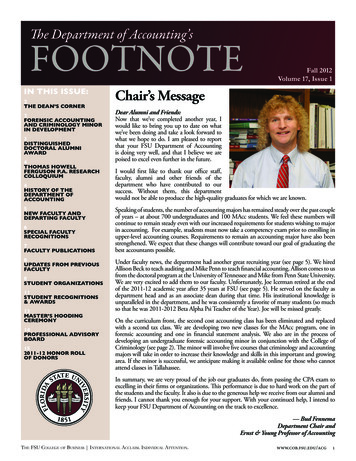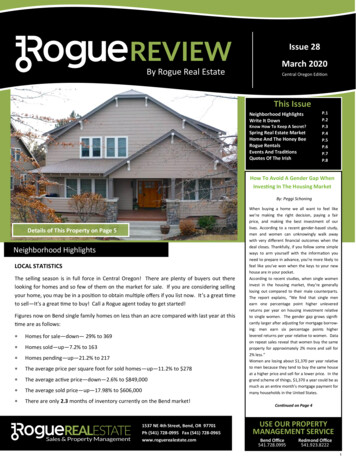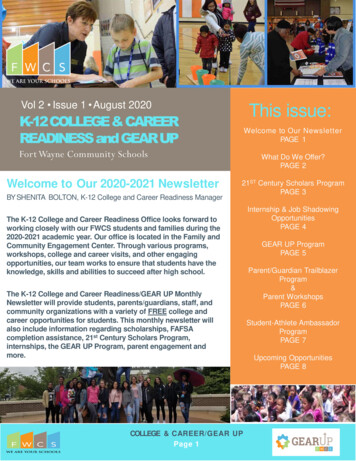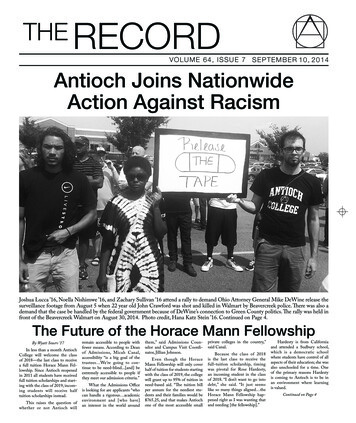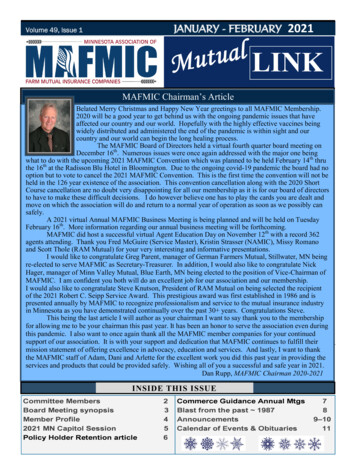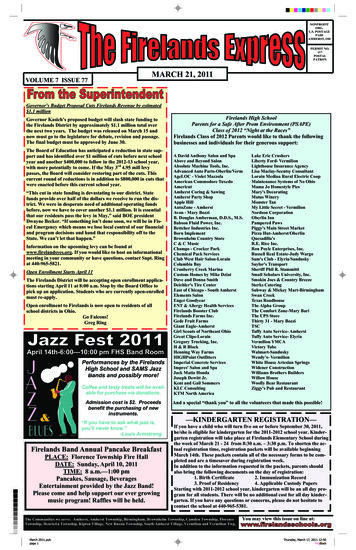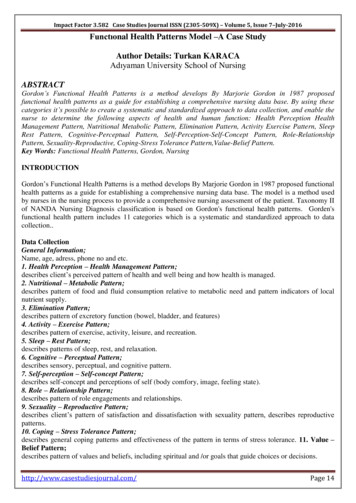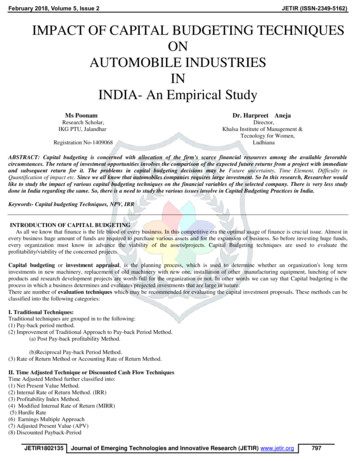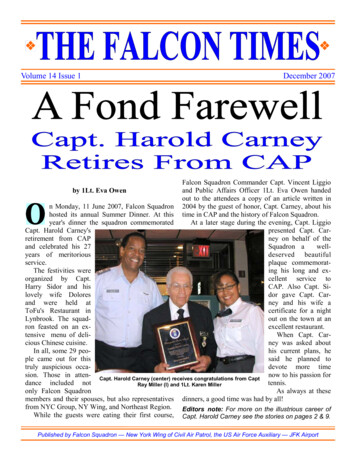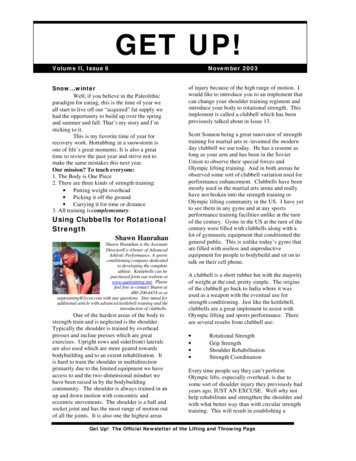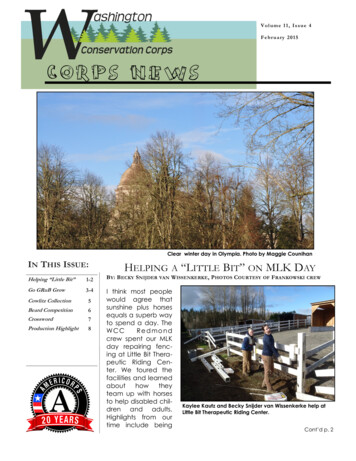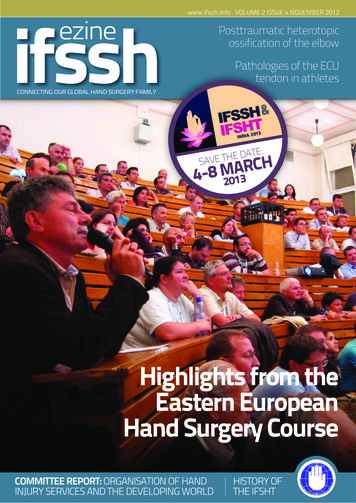
Transcription
ifsshezinewww.ifssh.info VOLUME 2 ISSUE 4 NOVEMBER 2012Posttraumatic heterotopicossification of the elbowPathologies of the ECUtendon in athletesCONNECTING OUR GLOBAL HAND SURGERY FAMILY:E DATEHTEVSACHRAM84- 2013Highlights from theEastern EuropeanHand Surgery CourseCOMMITTEE REPORT: ORGANISATION OF HANDINJURY SERVICES AND THE DEVELOPING WORLDHISTORY OFTHE IFSHT
A Journey of the Senses is a registered trademark Creative Travel
November 2012Contents4 EditorialBy Professor Ulrich Mennen, editor of the IFSSH ezineAnnouncement: The Living Textbook of Hand SurgeryObituary: Dieter Buck-Gramcko6 Share sectionVirtual exchange platform for Hand Surgeryequipment and supplies7 Letters to the editorIFSSH grant for Mongolian Hand Surgeons8 Members newsHighlights from the Eastern European Hand SurgeryCourse10 PulseIFSSH Committee on Humanitarian Missions:Organisation of Hand Injury Services and theDeveloping World14 Hand therapyHistory of the International Federation of Societies forHand TherapyIFSSH ezine NOVEMBER 201217 Research RoundupRisk Factors for Posttraumatic Heterotopic Ossificationof the ElbowPathologies of the ECU Tendon and its Investments inthe AthleteThe Interosseous Muscles: The Foundation of HandFunction20 Pioneer profilesSydney Sunderland23 Clinical caseX-ray case study for discussion25 Journal highlightsTables of Content from leading journals such as TheJournal of Wrist Surgery, The American Journal ofHand Surgery, Journal of Hand Surgery Asian Volume,Journal of Hand Surgery European Volume and theJournal of Hand Therapy.30 Upcoming eventsList of global learning events and conferences forhand surgeons3
editorialDear colleaguesWe have a very exciting announcement to make:The launch of The Living International Textbook of Hand SurgeryThis concept, of having a constantly updated textbook on Hand Surgeryavailable, free of charge, at the click of a button, by anybody, everywhere, echoesthe ‘aims’ of the IFSSH Charter. The IFSSH thus endorses this initiative fully. All interested members of the Hand Surgery family are invited to participate. The ideais to make this project a truly international effort, an idea akin with the drivingthought behind the IFSSH ezine: “for the Members, by the Members”. We wouldlike to thank Dr Richarda Böttcher and Ms Anita Eppelin for their sterling workand enthusiasm to launch this important and very exciting venture. Every member of our Hand Surgery Family is invited to participate and contribute. Clickhere to read more and for more information visit: www.handbookhand.com.The International Federation of Societies for Hand Therapy (IFSHT) hasbecome an integral part and essential partner of our effort to manage Handconditions optimally. Hand Therapy is a collective designation, which includesrehabilitation, splint making, occupational therapy and physiotherapy. HandTherapists are at the same time also innovators, counsellors, motivators, and often have to act as a confidant! We salute the contribution Hand Therapists makein our effort to get the best results. It is for these reasons that we include in everyIFSSH ezine a practical contribution which has very important and helpful tipsand advice for Hand Therapists, as well as Hand Surgeons. This issue features thehistory of the IFSHT.Congress time! Please do not forget to register for the IFSSH Congress inNew Delhi, 4-8 March 2013! Register today at www.ifssh-ifsht2013.comWith sincere regardsUlrich MennenPresident: IFSSH. Editor: IFSSHezineIFSSH disclaimer: The IFSSH ezine is the officialmouthpiece of the International Federation of Societiesfor Surgery of the Hand. The IFSSH does not endorsethe commercial advertising in this publication, nor thecontent or views of the contributors to the publication.Subscription to the IFSSH ezine is free of charge and theezine is distributed on a quarterly basis. To subscribe,please click here. Should you wish to support thispublication through advertising, please click here.4AnnouncementThe Living Textbook of HandSurgeryThe development of an Open AccessE-book for information, education andscience in Hand Surgery.E-learning and multimediacommunication have changededucation and the distribution ofscientific findings fundamentally.So it seemed only consequential todevelop an internet based textbookfor Hand Surgery according to theideas and goals of the Open Accessmovement. The idea was born in2011 and developed to an elaboratedconcept for contents, networking andfinancing.What does ‘Open Access’ mean?The Budapest Open Access Initiativestates that open access to scientificand scholarly literature is “freelyavailable on the public internet,permitting any user to read, download,copy, distribute, print, search, or linkto the full texts of these articles, crawlthem for indexing, pass them as datato software, or use them for any otherlawful purpose, without financial, legal,or technical barriers other than thoseinseparable from gaining access to theIFSSH ezine editorial team:Editor: Professor Ulrich Mennen (President of the IFSSH)Deputy Editor: Professor Michael TonkinO THE(President-elect of the IFSSH)SUBSCRIBE TPublication coordinator:ezineMarita Kritzinger (Apex ezines)Graphic Designer: Andy GarsideifssFRhEEFOR
editorialObituaryinternet itself. The only constraint onreproduction and distribution, and theonly role for copyright in this domain,should be to give authors control overthe integrity of their work and the rightto be properly acknowledged andcited”.The aim of the Open Access (OA)movement is to make scientific andscholarly literature openly accessibleonline to all users free of charge.The conceptThe purpose is to create a LivingTextbook of Hand Surgery whichwill include basic principles, clinicalaspects and information aboutdiagnostic and treatment methodsconcerning hand surgery. It will beenriched by multiple figures, tables,photos and videos. Scientific reportswill also be included.Who is involved?Amongst other partners GermanMedical Science is the main sponsorand the IFSSH endorses this initiative.Do you want to participate?Currently the first chapters are in preparation. Several chapters still need contributors. You are welcome to contact:richarda.boettcher@hand-ww.deMore informationAt the IFSSH Congress in New Delhi 4-8March 2013 there will be an exhibitionbooth and a presentation to providepeople with more information.www.handbookhand.comIFSSH ezine NOVEMBER 2012Professor Dieter Buck-Gramcko, Hamburg,GermanyProfessor Dieter Buck-Gramcko passed away inHamburg on 3 October 2012, only a few days after thedeath of his wife and shortly before his 85th birthday.Dieter Buck-Gramcko was born in Hamburg on 28October 1927. After school he studied medicine andsurgery in Hamburg and Düsseldorf. His interest inhand surgery started very early, and was ‘confirmed’after spending time with Professor Eric Moberg. Hestarted the first independent Hand Surgery Department of Germany in Hamburgin 1963, and was its head until his retirement in 1992. He was instrumental in theestablishment and organisation of Societies for Hand Surgery in German speakingcountries, as well as being a founding member of the European and InternationalHand Surgery Federations. Amongst a number of Societies, he was president ofthe IFSSH from 1974 to 1975.Besides general- , micro- and plastic hand surgery, he was especially interestedin congenital hand malformations. His special interest was pollicisation, which wasalso the topic of this post-doctoral qualification in 1971. He performed this operation in many countries all over the world and his technique is still used worldwide.Due to his many international friendships and contacts, Hamburg became a‘Mecca’ for hand surgery colleagues.Amongst innumerable lectures, his scientific work also included 168 articlesand 99 book chapters, as well as being editor/author of a number of books. Hefounded the German Journal for Hand, Micro and Plastic Surgery and was its editor for more than 30 years.He was an honorary member of many National Hand Surgery Societies allover the world. His most esteemed honours were the nominations as HonourableMember of the American Society for Surgery of the Hand in 1971, Honorary Fellow of the Royal College of Physicians and Surgeons of Glasgow in 1980 and ‘IFSSHPioneer of Hand Surgery’ in 1998.After a severe illness in 2001 Dieter Buck-Gramcko retired to a mostly privatelife, but he still continued to show a keen interest in hand surgery.With his death we lose a friend, a colleague, a mentor, an innovator, an originalthinker, a founding member of organised Hand Surgery, and an original memberof the ‘first generation of modern hand surgeons’We will always remember him and be inspired by his hand surgery work, evenafter his death.Dr Rolf HabenichtPresident, German Society for Surgery of the Hand5
ShareShare SectionThe Exco of the IFSSH receivesoccasional requests by individualsor Hand Surgery Units for donationsor financial support to purchaseinstruments, books, and variousequipment needed to practise theirtrade as fellow Hand Surgeons andTherapists.Many of our members havesurplus instruments and other suchitems which could be of use to thosein less fortunate circumstances. TheIFSSH ezine would like to dedicatea ‘Share Section’ in every issue tofacilitate contact between thoseseeking support and those looking forrecipients of their surplus.6If you have anything whichanother Surgeon or Therapist mayuse in her/his practice, please offer itby sending a short description of theitem(s) to the Editor(ezine@ifssh.info),as well as a contact email address.If you are in need of a specific item,you are also welcome to send a shortemail to the Editor with your requestand a contact email address.NB: The IFSSH ezine acts solelyas contact agent, and does nottake any responsibility for anyexchanged goods. The actualexchange and arrangements are thefull responsibility of the two partiesinvolved.IFSSH ezine NOVEMBER 2012
letters to the editorLetters to the editorIFSSH grant for Mongolian Hand SurgeonsFirst of all, I wish to express appreciation to all involved in this project of bringing Mongolian HandSurgeons to the USA for exposure to current Hand Surgery methods and techniques. I wish tothank the IFSSH officers and representatives for funding this project in the amount of 12,000.In this regard, I am formally requesting that the grant money now be forwardedto the American Association for Hand Surgery (AAHS). Further, I am asking Ms SarahNeece of the AAHS administrative staff to coordinate the receipt of this money to thebanking account whose details were previously disclosed to you by the AAHS. She willalso oversee use of this money, upon my request, that it will be carefully used for thedescribed purposes. An accounting of the expenditures will be given later. In addition areport will be provided to the IFSSH summarising the benefits received through thisinternational and inter-organisational endeavour.In October 2010 with the help of an interpreter, I was the first Western HandSurgery specialist to be able to transmit a substantial amount of informationthrough lectures and surgery to the Mongolian Hand Surgeons. I personallyobserved their large workload and the limited resources that they had atthe National Trauma Hospital in Ulaanbaatar. This was the only traumahospital for the entire country of Mongolia. Prior attemptsfor microsurgical training of one Mongolian surgeon in anearby country had not been very successful, judged by itsapplication in Mongolia.The generosity of the IFSSH in promoting thisextremely worthwhile project is greatly appreciated.Many thanks also to all who acted in such a positivemanner because these actions will benefit allMongolians for many years to come.Sincerely yours,Robert R Schenck, MDProfessor Emeritus, Dept of Plastic / HandSurgeryRush UniversityChicago, IL 60612USAIFSSH ezine NOVEMBER 20127
members newsEastern EuropeanHand Surgery CourseSeptember 2012The sharing of knowledge is one of thekey aims of the IFSSH and FESSH. Forthis reason, IFSSH Secretary General,Professor Zsolt Szabo recruited anenthusiastic and well-known facultyfrom across Europe, Turkey and SouthAfrica, to teach over 120 surgeonsfrom Eastern Europe. The venue wasthe spa town of Hajduszoboszlo in theHortobagy region of Eastern Hungary,about two and a half hours drive fromBudapest.The course was designed to beas cost-effective as possible for thedelegates (costing just 300) helpedby very generous sponsorship fromseveral companies and by the facultywho gave up their time for free to8prepare the lectures and teach. Thecourse was hugely oversubscribed - atestament to the quality and valueof the programme. Asszisztencia, theHungarian management firm whichalready provides invaluable support forFESSH, gave flawless logistical assistancethroughout the three day course.The first day comprised severallectures on topics such as Dupuytren’sand wrist arthroscopy. The secondday involved a 30 minute bus tripacross the vast Hungarian plains to theMedical School at Debrecen University.Here, the faculty provided 12 surgicaldemonstrations on cadavers ontechniques such a tendon transfers,wrist replacement, wrist arthroscopy,skin flaps and distal radius fixation. Astate-of-the-art IT system allowed thedissections and surgical techniques tobe projected at high definition into alecture hall, from where the delegatescould ask questions. The third day wasback in the lecture hall, with furtherlectures on broader educational topicssuch as the basics of congenital handsurgery, the future of nerve surgeryand operations that should no longerbe performed.The other aspect of the coursewas, of course, social. This was a greatopportunity for the delegates andfaculty from so many countries tomeet each other and develop friendlyand professional contacts. The firstIFSSH ezine NOVEMBER 2012
members newsevening had a Hungarian supper withtraditional dancing and music fromseveral accomplished performers. Thesecond evening, of some concernespecially to the staid and shy Britishauthor of this report, was a pool party- everyone in their bathing costumesrelaxing in the hot natural spring waterfor which Hajduszoboszlo is famous.For the faculty, there was theopportunity for a four day cycle andwine tour after the course. To keep thecosts for the course at a minimum,the faculty willingly paid for thisthemselves. We were able to cyclealongside a beautiful lake, across fieldsand up rather steep hills (rewardedby the free-wheeling down the otherIFSSH ezine NOVEMBER 2012side). As a special event,there was even a five milesection of tranquil river thatwe paddled along in ratherwobbly canoes. To keep ussafe on the road sections,two police motorcyclistsaccompanied us and keptthe trucks and cars away. Inthe evenings we had the opportunityto try the local Tokaji wines for whichthe region is rightly famous.Many thanks to the delegatesfor wanting to come to the course,to the faculty for providing theprogramme, and to Professor Szaboand Asszisztencia for the meticulousarrangements. This sort of programmeis really what makes Hand Surgerysuch a special thing.David WarwickMD FRCS FRCS(Orth) EDHSHand Surgeon, University HospitalSouthampton, UKTraining Committee Chairman, FESSHdavidwarwick@handsurgery.co.uk9
Pulse: Committee ReportsIFSSH Committee onHumanitarian MissionsOrganisation of Hand Injury Services and the Developing World:Challenges and OpportunitiesChairman: W Bruce Conolly and Marco LanzettaMembers: W J Cumming, Des SoaresKofi Annan, former Secretary Generalof the United Nations, defined adeveloped country as follows: “ADeveloped Country is one that allowsall its citizens to enjoy a free andhealthy life and a safe environment”.However according to the UnitedNations Statistics Division there isno established convention for thedesignation of the developed anddeveloping countries or areas inthe United Nations System. For thepurposes of this report, a developingcountry is one in which all its citizensdo not enjoy a free and healthy life or asafe environment.In developing countries thepopulation is poor and most of thepopulation earn their living by theirhands. Hand injuries and infectionsare more common than in developedcountries, as are diseases such asleprosy. Burns and neglected traumaare high on the list of medical10necessities. There are many locationswhere civil wars and land mines arestill an issue. Congenital malformationsare frequent and go virtually untreated,with severe implications on the abilityof these children to get a job.There are few surgeons to treatthese patients with hand problems.Most of those in the field are generalsurgeons with minimal training inhand surgery and rehabilitation. Theauthors have worked in countries withless than five general surgeons in theentire country.Hand Surgery outreachMembers of the IFSSH over many yearshave been involved in volunteer handsurgery and rehabilitation projects inmany developing countries around theworld. Some of the member surgeonshave worked individually throughprivate contracts. Some members havebeen associated with their professionalcollege umbrella e.g. OrthopaedicOutreach from the OrthopaedicAssociation of Australia.Others have been involved withInterplast, GraceWorks, LeprosyMission, Resurge International andCuban Medical Internationalism. Somehave founded and/or managed nonprofit organisations or NGOs dedicatedto hand surgery in developingcountries.Australian orthopaedic outreachprogrammes started around 1970with the CARE MEDICO programmein Indonesia. Subsequent educationalprogrammes have been active andprogressive in many nations. Individualsurgeons work in many centres andthis may lead to more formalisedactivity as they develop. Specificformal programmes of the AustralianOrthopaedic Association occur nowin Fiji, Papua New Guinea and theSolomon Islands, including training inIFSSH ezine NOVEMBER 2012
Pulse: Committee ReportsIFSSH ezine NOVEMBER 201211
Pulse: Committee Reportshand surgery.In 1991, the American Society forSurgery of the Hand established aVolunteer Services Committee to fosterinternational medical work by ASSHmembers in developing countries. Thedevelopment of the ‘Hands Around theWorld’ Committee by the InternationalFederation of Societies for Surgeryof the Hand in 1992 presented aunique opportunity for world-widecollaboration in this work by HandSurgeons.In 1995 the Royal AustralasianCollege of Surgeons successfullytendered for the Australiangovernment AudAID project andbecame the provider of all tertiarysurgical health services to the PacificIsland nations and Papua New Guinea.In 1998 the second phase of thisactivity began, with the upgrade of theFiji School of Medicine and distancelearning and teaching.Member contributions Ulrich Mennen (President of theIFSSH and based in South Africa)feels that in developing countriesit is more important to train willingpractitioners how to do HandSurgery, rather than to train themto become fully fledged HandSurgeons. Gujera (from India)has the same view. CorrianneVan Velze (Past-President of theIFSHT and based in South Africa)has for many years been activelyinvolved in training therapists inmany developing countries onbasic principles in Hand Therapy,splint making and rehabilitation,on occasion combined with HandSurgery input from Ulrich Mennen.12IFSSH ezine NOVEMBER 2012
Pulse: Committee Reports David Green has extensiveexperiences in non-sponsoredvolunteerism in Haiti (the StateUniversity Hospital of Haiti). Barry Gainor, Chairman of HealthVolunteers overseas Inc. continueshis work in Peru. Graham Gumley has for yearsorganised Hand Surgical and othersurgical treatments for the poorand underprivileged people at theSihanouk Hospital Centre of Hopein Phnom Penh, Cambodia. Bruce Conolly and Peter Scougallhave been involved in HandSurgery and Rehabilitationprojects in Vietnam, Laos andMyanmar. Bruce Conolly has alsobeen involved in other projects inAfrica, the Middle East and manySouth East Asian and Pacific Islandcountries. Grace Warren over many, yearshas done Leprosy and other HandReconstruction work in numerousdeveloping countries around theworld. Des Soares, a Hand Surgeon basedin Brisbane Australia from 1990 to1997 worked as a ReconstructiveSurgeon in the Leprosy Hospitalin Nepal and since then hasbeen involved in Pacific IslandProjects (PIOA) with the support ofOrthopaedic Outreach of the RACSof Australia. James Kong from Hong Kong andBurma has organised excellentTrauma courses in the Asia PacificRegion. Marco Lanzetta (Milan, Italy) hasbeen involved in programs in Africa.In Africa a specific hand surgeryhumanitarian programme is providedIFSSH ezine NOVEMBER 2012“Members ofthe IFSSH overmany years havebeen involved involunteer handsurgery andrehabilitationprojects in manydevelopingcountries aroundthe world”by the NGO GICAM, an InternationalOrganisation with headquarters inItaly. Currently, this NGO is involvedin programmes in the followingcountries: Ghana, Togo, Benin, BurkinaFaso (all in West Africa) and Kenya.GICAM has also completed a threeyear programme in Sierra Leonewhere they built and managed a smallhospital in Makeni, about four hours’drive north of the capital Freetown.Typically, GICAM teams are formedby 6-7 members which include twoHand Surgeons, one anaesthesiologist,two or three nurses, including ascrubbing nurse and one handtherapist. The team flies to specifichospitals where basic equipment forsurgery and nursing care in the wardare guaranteed. All the necessarysurgical instruments to perform low,medium and high level difficultyhand reconstructions are carried inspecially designed steel trolleys whichaccompany the team by air. Usedmaterial is reintegrated after everyvisit and prepared for the next trip.The visits are planned every threemonths and work is done on patientsselected and put on a waiting list bythe previous team. The average lengthof stay is about two weeks. GICAMVolunteer workers have come fromItaly, Switzerland, Canada, Poland,and Czech Republic. GICAM dealsmainly with paediatric post-traumaticdisorders, congenital malformations,as well as secondary reconstruction ofneglected trauma cases.For more information on voluntaryorganisations see the list below:1. Medical Missions (orthopedic)/2. Gracepatt Ecotours www.gracepattecotourskenya.org3. ReSurge International www.resurge.org4. Emergency Surgery of theHand in Developing Countrieswww.ptolemy.ca/members/archives/2006/hand 1.htm5. Healing Hands Globalportal.umich.edu/healing-hands.phpEDITOR’S NOTE: The above Reportis not necessarily exhaustive. Muchgoodwill to reach out and help isdone by many more in far-flungplaces. On behalf of the IFSSH, asincere appreciation is extended to allHand Surgeons and Hand Therapistswho so willingly give freely, to helpthose unfortunate who are in need.Also, a word of thanks is due to allthose who generously support thesehumanitarian missions.13
hand therapyHistory of the InternationalFederation of Societies forHand TherapyCompiled by Sarah Ewald, IFSHT President-Elect (2010 – 2013)The International Federation ofSocieties for Hand Therapy (IFSHT) wasfounded in 1987 for the purpose ofcoordinating activities of the variousnational societies for hand therapy andincreasing and enhancing the exchangeof knowledge of hand therapy.Thanks to an initial invitationfrom Dr Alfred Swanson on behalfof the IFSSH, the participation oftherapists at the IFSSH Congresses inthe Netherlands in 1980, USA in 1983,and Japan in 1986 helped to lay thegroundwork for the founding of IFSHT.It was the vision and inspirationof Evelyn Mackin that led the waytowards the creation of IFSHT. In14December 1986, a group of therapistsled by Mackin met during the jointmeeting of the French Hand Surgeryand Hand Therapy Societies in Paris,France. Encouraged by Doctors RaoulTubiana (France), Yves Allieu (France)and Georgio Brunelli (Italy), the IFSHTwas formed, officially registered asa Federation in Montpellier on 10thDecember 1987. Initial membersocieties were Belgium, France, GreatBritain and USA.Credit for the major portionof essential groundwork must begiven to the first generation of handtherapists: Evelyn Mackin, JudyColditz, Elaine Fess, Rosalyn Evans,and Judy Bell-Krotoski from the USA;Victoria Frampton from Great Britain,Paul van Lede and Jacques Otthiersfrom Belgium; Jean-Claude Rouzaud,Philippe Chamagne, and DominiqueThomas from France and WimBrandsma from the Netherlands.The first IFSHT Congress was heldin Tel-Aviv, Israel in 1989. Ten countrydelegates from Australia, Belgium,France, Great Britain, Italy, Israel, NewZealand, Poland, South Africa, and USAformed the council. Taiwan and theNetherlands attended as observers.Officers elected were Evelyn Mackin,President (USA); Jean-Claude Rouzaud,Secretary General (France); Corriannevan Velze, Historian (South Africa).IFSHT continued meetingtriennially: in Paris, France in 1992;Helsinki, Finland in 1995; Vancouver,Canada in 1998; Istanbul, Turkey in2001; Edinburgh, Scotland in 2004;Sydney, Australia in 2007, and Orlando,Florida, USA in 2010. As often aspossible, IFSHT meets at the same timeand in the same location as IFSSH.In 2013 IFSHT and IFSSH will meettogether in New Delhi, India. IFSHTcontinues to enjoy the co-operationand support of IFSSH.To date there have been eightPresidents of IFSHT from six differentcountries: Evelyn Mackin (USA) 1987-1992 TelAviv, Israel Jean-Claude Rouzaud (France)1992-1995 France Victoria Frampton (UnitedIFSSH ezine NOVEMBER 2012
hand therapyPicture of Presidents of IFSHT: Back row; (L) to (R): Maggi Persson (Sweden) 2004-2007; Annette Leveridge (UK) 2001-2004; Lynne Feehan (Canada)2010-2013; Judy Colditz (USA) 2007-2010; Corrianne van Velze, (South Africa) 1998-2001; Front row; (L) to (R): Victoria Frampton (UK) 1995-1998,Evelyn Mackin (US) 1987-1992, and Jean Claude Rouzaud (France) 1992-1995. Kingdom) 1995-1998 VancouverCorrianne van Velze (South Africa)1998-2001 IstanbulAnnette Leveridge (UnitedKingdom) 2001-2004 EdinburghMargareta Persson (Sweden) 20042007 SydneyJudy Colditz (USA) 2007-2010OrlandoLynne Feehan (Canada) 2010-2013New DelhiIFSSH ezine NOVEMBER 2012Organisational structureIn 2006 the official registration of IFSHTwas moved to Winterthur, Switzerlandand a Swiss bank account establishedfor the Federation. Membership hascontinued to increase. Rather thanwaiting until each Triennial Delegates’Council Meeting to accept newmember societies, IFSHT now is able toaccept electronic voting for approvalof membership and other mattersbetween the triennial congress times.Currently the IFSHT has 31 fullmember countries, five correspondingmembers and 3 commercial members.Full members are Argentina, Australia,Belgium, Brazil, Canada, Colombia,Denmark, Finland, France, Germany,Greece, Hong Kong, India, Ireland, Italy,Japan, Kenya, Korea, Netherlands, NewZealand, Norway, Portugal, Slovenia,South Africa, Sweden, Switzerland,15
hand therapyTurkey, United Kingdom, United Statesof America, Uruguay, and Venezuela.Corresponding members are Latvia,Jordan, Bahrain, Barbados and Mexico.In 2007 a new official IFSHTlogo was chosen for IFSHT and isnow synonymous with IFSHT. Priorto 2007, the IFSHT Newsletter wasprinted annually in paper form anddistributed to member countrydelegates. Currently the IFSHT Update,a one-page newsletter is publishedelectronically four times a year anddistributed to all member societiesas well as published in the US-basedJournal of Hand Therapy and the UKbased Hand Therapy.In 2008 the IFSHT MissionStatement was created: “Providingglobal networking and educationalopportunities to develop and enhancethe practice of hand therapy”. Thisstatement guides the IFSHT ExecutiveCommittee and delegates in theirdecision making.The IFSHT is a totally voluntaryorganisation and currently doesnot maintain a central office.Communication within the ExecutiveCommittee is facilitated by electroniccorrespondence and electronictelephone conference calls. Fundsfor the activities supported by IFSHTcome from annual membershipfees, direct donations, and a triennialsilent auction. The Triennial IFSHTSilent Auction helps to raise funds fortherapists to attend the next IFSHTTriennial Congress. Goods from all overthe hand therapy world are donatedfor this fun event.The IFSHT membership fee hasintentionally been kept reasonableat 50.00 (US) per annum plus 1.0016“In addition toour TriennialCongresses, IFSHTcontinues to seekways in whichwe can providenetworking andeducationalopportunities tofurther the practiceof Hand Therapythroughout theworld”(US) per member of the memberorganisation, so even the smallestsociety can afford to participate.IFSHT activitiesThe development of the IFSHTwebsite was begun in 2001, and isupdated regularly. The website servesas an information and communicationplatform between member countriesof the IFSHT as well as for the generalpublic. (www.ifsht.org)The IFSHT has developedsponsorship opportunities fortherapists to attend internationalmeetings and has supportedprojects to teach therapists abouthand therapy. IFSHT has supportedvolunteer teaching projects inMoldova, Peru, and Armenia. TheFederation has also helped makeconnections for projects andencourages therapists to share theirexpertise. Past President MaggiPersson, has travelled to Kenya andEthiopia to provide hand therapycourses to local therapists and is oneof many dedicated, highly skilledhand therapists who travels the worldsharing skills and knowledge withother therapists wishing to developtheir hand therapy skills. IFSHT alsohas a visiting therapist programmethat allows therapists to contact handtherapists in other countries andarrange clinical visits. This cultural andeducational exchange was initiallyformulated in 1998. IFSHT also assistswith locating hand therapists forpatients who are travelling outsidetheir home country.The IFSHT Education Committeemainta
IFSSH ezine a practical contribution which has very important and helpful tips and advice for Hand Therapists, as well as Hand Surgeons. This issue features the . to software, or use them for any other lawful purpose, without nancial, legal, or technical barrier
